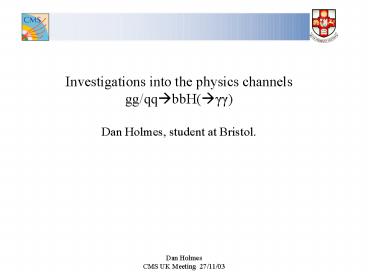Dan Holmes
1 / 15
Title: Dan Holmes
1
Investigations into the physics channels
gg/qq?bbH(???) Dan Holmes, student at Bristol.
2
Overview
- I looked at 1 and 2 b-jet requirement for each
of - SM qq/gg?bbH(??), MH125 GeV
- MSSM bbh(??). tanß30, MA144 GeV (Mh127)
- MSSM bbH(??), tanß30, MA116 GeV (MH128)
b
b
H
gg
?
?
H
b
b
- Motivation measurement of Yukawa b-H coupling,
ratio of H-b/H-t etc.., Higgs verification, MSSM
verification - I used CMSJET vers 4.801 with PYTHIA vers 6.205
- Also Spiras HQQ 1.1 (Hbb production x-sect) and
HDECAY 3.0 (BR of H???).
3
Background
- The principle background for this channel is
qq/gg??? a jet (or two) coming from ISR/FSR
..PU etc... - Secondary background from qq/gg?qq two gammas,
either real or faked by pions. - treating the two ? from the second background as
independent, I can put an upper limit on
background (2) of lt 5 events per 100fb-1 as long
as bTaggt0 for 2 jet case and gt1 for 1 jet case MH
windowlt/-3GeV. - carry these constraints forward to
optimisation stage
4
step 1, Find cross sections
eg. for MSSM h case
HQQ
Effective x-sect vs MA. Several values of tanB
from 5 to 30.
HDECAY
So biggest x-sect is 1.20 for MA 144, tanb30
(Mh127.1)
5
I chose the following
...Spira then suggests multiplication by K1.6
for NLO/LO for all three channels.
6
Production
- I made some events 1 million for each of smH,
mssmH and mssmh. Pythia?CMSJET - I made some background 10.5 million qq/gg??? and
4 million qq/gg?qq. - All included 17.3 superimposed min bias events
as PU. Limited to recycling a PU sample of 25k
events due to file size.
7
some pics
- signal (left) , principal background (right)
..both decay exponentially. The background is
bigger but decays faster.
8
Apply some cuts and then optimise them
- basic CMS acceptance cuts
- di-? trigger, Pt ?s gt 40,25.
- both ? isolated in tracker and ECAL.
- CMSJET modified UA1 type jet-finder. (cone r0.5)
- 1 or 2 jets Pt gt 20.
- FATSIM b-tagging utility. ff-bar back limits
bTaggt0 for 2-tags, gt1 for 1 tag.
- Optimisation cuts investigated
- Pt?1, Pt?2, delta PtGam (Pt?1-Pt?2)
- Pt Jet1, Pt Jet2, deltaPt Jet (PtJet1-PtJet2)
- b-tagging efficiency
- Higgs mass window size
- Pt H
- topological cuts ..not so useful, but maybe
useful for background (2).
9
optimisation procedure
- Define an optimisation parameter. (following
slides!) ..some sort of signal significance. - Run a scan over the N-d cut space, for each
combination of cuts return the mean number of
expected signal and background entries for 100
fb-1. - Follow the significance gradient and define
islands. Re-scan using finer steps over the
islands. - Return combination of cuts for best
significance. Ensure the significance gradient
over the island is smooth otherwise it could be a
random fluctuation (although big stats really is
the key to reducing this).
10
The results eg, 1 jet SM Higgs case
acceptance cuts
optimised cuts
..very similar stuff for mssm cases, mssmh has
bigger cross section..
11
statistics aside
- what is the best optimisation parameter?
- LEP-type significance
- ..return in terms of number of Gaussian sigmas
the chance of the background having fluctuated to
give a reading above that observation. - Several methods to do this quickly
- ,
...
...and it can also be calculated explicitly for
low s,b.
12
statistics aside
...BUT we are doing studies of physics at a
planned experiment. - we have not made an
observation, we just know the mean number of
expected events. If you use the previous test
then it corresponds to a 50 probability. - maybe
a better question to ask is what is the chance
that we will make an n-s discovery? ..maybe we
should talk in terms of this and it use it as an
optimisation parameter??
It can be approximated by or calculated
explicitly when not in the Gaussian limit.
These are just my thoughts, not the official CMS
Higgs group method!
13
Results
- the high significance regions essentially
involve finding the point at which the background
disappears. - for such a fine signal optimisation, very (very
very) accurate knowledge of the background is
needed, i suspect the PYTHIA approximation is not
adequate.
14
more recently..
- ..compHEP (Mikhail Dubinin)
- 5k evts irreducible back (bb??) 70 fb
- 50k jetjet?? (light quarks/glu) 60 pb
- ..i ran it through cmsjet (pythia
hadronisation)..added PU.
..doesnt look good.. ..but i dont have enough
stats in high significance region to try and do
some optimisation...
20 events from the bb ?? back.
15
next...
- i will have a look at the background using alpGen
..there is a problem at the moment, it will take
1 week to fix (4 weeks ago). - maybe more tuning (loosening!) of jet-finder
params, isolation ? of etc.. will make some
difference..? (clutching? ...straws?) - dont bank on this being a major CMS channel, but
maybe the stats questions are worth thinking
about..































